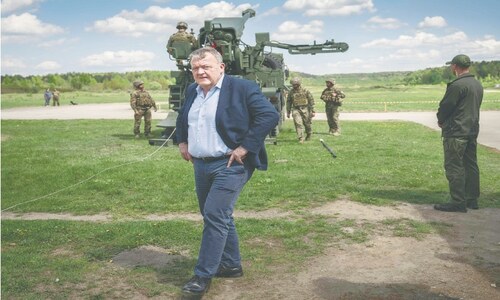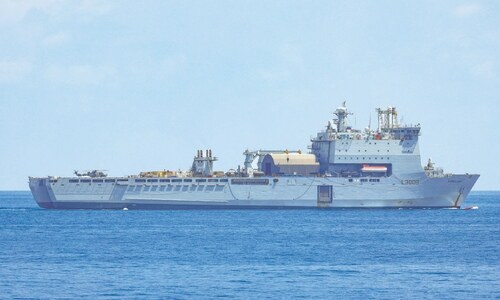GENEVA, Nov 23: US Secretary of State John Kerry and five foreign ministers launched an intensive diplomatic push on Saturday to close a deal curbing Tehran’s nuclear programme while cautioning that significant obstacles remained on the fourth day of marathon talks.
Diplomats refused to spell out details of the talks, held in a five-star Geneva hotel. But comments from both sides suggested they were focused on wording of the final agreement.
The goal is to hammer out an agreement to freeze Iran’s nuclear programme for six months while offering the Iranians limited relief from crippling economic sanctions. If the interim deal holds, the parties would negotiate final-stage agreements to ensure Iran does not build nuclear weapons.
Only then would the most crippling sanctions on Iranian oil sales and financial transactions be rolled back.
Despite the high-powered diplomatic participation, it was unclear whether the current round, which began on Wednesday, would produce any first-step deal.
The Iranians, mindful of opposition to any restrictions among hard-liners back home, have insisted on retaining the right to produce nuclear fuel by enriching uranium, saying they need it to produce electricity and for scientific research.
They also are holding out for maximum relief from sanctions hurting their economy, while the United States and its allies want to relax sanctions in small, incremental steps.
Talks on Saturday appear to have included ways Iran could retain some level of enrichment, albeit at a level far below what’s need for weapons. Other roadblocks were believed to include the level of sanctions relief and the future of a plutonium reactor under construction at Arak that the six want closed. Plutonium can also be used to make weapons.
It was also unclear whether the negotiations would continue on Sunday.
Kerry is to meet with Libyan Prime Minister Ali Zidan in London to discuss the security situation and ongoing political reforms in that country.
Kerry and his counterparts from Russia, Britain, France, China and Germany joined the Geneva talks after Iranian Foreign Minister Mohammad Javad Zarif and top European Union diplomat Catherine Ashton reported progress on enrichment and other issues on Friday.
Their participation raised speculation that an agreement was close — an interpretation that the foreign ministers themselves sought to discourage.
British Foreign Secretary William Hague spoke of “very difficult negotiations,” over issues that blocked agreement at the last round earlier this month.
“We’re not here because things are necessarily finished,” Hague told reporters. “We’re here because they’re difficult, and they remain difficult.’’
Among the key stumbling blocks, uranium enrichment is especially sensitive. Iran insists it has no interest in nuclear weapons but needs to enrichment to generate electricity and for scientific and medical purposes.—AP
















































Dear visitor, the comments section is undergoing an overhaul and will return soon.